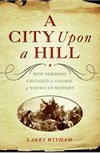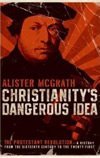A couple of new titles from HarperOne showed up here last night. Both look excellent. As a reader and reviewer who focuses on Christian books, it’s easy to keep an eye on the Christian publishers and neglect to watch the mainstream ones. But Harper sometimes publishes notable volumes that I wouldn’t want to miss.
 The first is A City Upon a Hill: How Sermons Changed the Course of American History by Larry Witham. Here is the publisher’s description:
The first is A City Upon a Hill: How Sermons Changed the Course of American History by Larry Witham. Here is the publisher’s description:
The Puritan founder John Winthrop preached about “a city upon a hill,” Abraham Lincoln’s two greatest speeches have been called “sermons on the mount,” and Martin Luther King’s “I Have A Dream” oration is nothing if not a sermon. Not only can the history of the United States be told through its reflection in the landmark sermons preached from its pulpits and in front of its memorials, but in fact it was often the sermon that inspired and helped define American history.
Between the colonization of America and the terrorist attacks of September 2001, the sermon has both shaped America’s self–understanding and reflected both sides of its most important social, political, military, and philosophical debates. That is the story of A City Upon a Hill: How the Sermon Made America, a narrative history of events, people, and ideas, showing us at our best––and sometimes at our worst. The book will cover American history from 1606 to 2001, building links between the pulpit and politics, between preachers and presidents, between sermons and historical events.
A City Upon a Hill will elaborate on two unifying themes. The first and central theme will be the idea of America as a “chosen” nation (raised as recently as the second inaugural of President Bush in 2005). A second underlying theme will be the perennial debate in America between liberty and order. In addition, the role of the sermon as the first mass media will be examined.
As a narrative history, A City Upon a Hillwill ask about, for example, the role of religion in the American Revolution and slavery, whether religious affiliation has grown or declined in various centuries, and how much ideas and beliefs affected policies, and vice versa. The sermon offers a uniquely compelling vehicle to tell the national story. The sermon shows that what America says and believes can often be better than what it does, serving as a national conscience amid centuries of triumphalist claims. The sermon gathers together four centuries of disparate strands and provides a solid grip for defining a nation.
 The second title is Christianity’s Dangerous Idea: The Protestant Revolution–A History from the Sixteenth Century to the Twenty-First by Alister McGrath. Here is what the publisher says about it:
The second title is Christianity’s Dangerous Idea: The Protestant Revolution–A History from the Sixteenth Century to the Twenty-First by Alister McGrath. Here is what the publisher says about it:
The “dangerous idea” lying at the heart of Protestantism is that the interpretation of the Bible is each individual’s right and responsibility. The spread of this principle has resulted in five hundred years of remarkable innovation and adaptability, but it has also created cultural incoherence and social instability. Without any overarching authority to rein in “wayward” thought, opposing sides on controversial issues can only appeal to the Bible—yet the Bible is open to many diverse interpretations. Christianity’s Dangerous Idea is the first book that attempts to define this core element of Protestantism and the religious and cultural dynamic that this dangerous idea unleashed, culminating in the remarkable new developments of the twentieth century.
At a time when Protestants will soon cease to be the predominant faith tradition in the United States, McGrath’s landmark reassessment of the movement and its future is well-timed. Replete with helpful modern-day examples that explain the past, McGrath brings to life the Protestant movements and personalities that shaped history and the central Christian idea that continues to dramatically influence world events today.
After a quick skim I can say that both titles look great and I’m looking forward to reading them…










